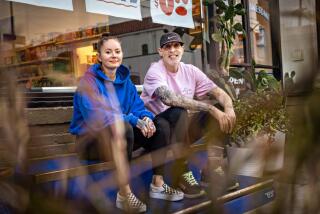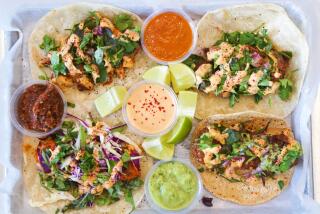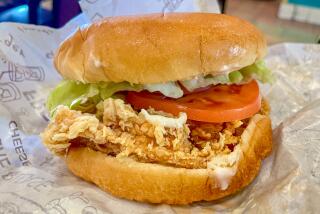Gregory Rodriguez: Chicken Boy lives
Two years ago on a warm afternoon in early April, I was waiting in a line for a No. 9 sandwich at the Eastside Deli just above Chinatown, when I suddenly heard the voice of Vin Scully coming from the sound system. I was a Dodgers fan as a kid, but not so much anymore. I wasn’t even aware the season had started.
But the lilting cadence of Scully’s voice cast a powerful spell on me. For a few precious moments, I was overwhelmed by a sense of well-being. Scully’s nasal, singsong twang took me back to a more innocent, carefree time in my life.
That’s the kind of feeling Highland Park graphic designer Amy Inouye wants to spread in Los Angeles. But the innocence she hopes to evoke is more societal than individual. She wants us all to remember a time when L.A. culture was more carefree, open and playful.
Four years ago, she and her partner, artist Stuart Rappaport, placed a 23-foot-high fiberglass statue of a man with a chicken head on the roof of their studio. You may have seen Chicken Boy if you’ve driven out Figueroa Street, just below Avenue 56. The hulking figure holding a bucket of chicken — Chicken Boy was once the mascot for a restaurant that stood at Fifth and Broadway downtown — evokes a goofier time in L.A. history, when Angelenos built drive-through doughnuts 22 feet wide and hot dog stands that looked like, well, hot dogs.
To Inouye and Rappaport, those roadside curiosities reflected a broad culture of wackiness they fear Los Angeles is losing. When Inouye moved to L.A. from the Bay Area in the mid-1970s, she recalls driving around and “always having something to look at that would make me smile,” including Chicken Boy. When the restaurant at Fifth and Broadway closed, Inouye saved the statue and then started selling Chicken Boy merchandise to fund his comeback. He’s a throwback, she says fondly, to “fun, sunny, bright, cheap and delicious” times.
Sure, pure nostalgia and rose-colored memory inspire part of Inouye’s lament. But she is also on to something of enduring importance.
Wacky used to go a long way toward defining us. The comedian George Carlin, a New Yorker by birth, called L.A. a “a goofy place” with a “charming kind of superstitious innocence.” English writer D.H. Lawrence labeled our fair city “silly” and confessed to being amused.
As for the natives, there were always those willing to wring their hands about a left coast inferiority complex, but a lot of us simply embraced the unserious labels with a love-it-or-leave-it mentality.
“For most of the last century we had nothing to lose,” says architect and historian Alan Hess. “We didn’t care what most of the world thought of us. We just did our own thing.”
Until recently. Hess traces the change to the early 1980s, when we hosted the Olympics. Los Angeles started claiming the role of a sophisticated, global city, talking about being the capital of the Pacific Rim and building more civic monuments — museums and arenas — to match our desired greatness.
“I think that’s when we became self-conscious,” says Hess. “That’s when we took a bite of the apple and lost our innocence.”
So we jettisoned Tail o’ the Pup as we built the likes of Disney Hall. Through that time, a more grownup L.A. also become more dynamic, inclusive and, one could say, more intent on solving the social problems it had been willing to sweep under the rug in more innocent times. Now, I’d like to think that Chicken Boy’s resurrection will spread. Why can’t our big-city sophistication coexist with the unselfconscious wackiness we once enjoyed?
When Inouye and Rappaport stood Chicken Boy atop their Highland Park roof, they weren’t trying to turn the clock backward. They were simply trying to give passersby a pleasant pause — to remind them, in Inouye’s words, that “it doesn’t have to be all serious.”
That’s a goal worthy of Los Angeles past, present and future. Keep moving forward, but don’t forget to let those feelings of well-being wash over you, like the sound of Vin Scully’s voice in spring.
grodriguez@latimescolumnists.com
More to Read
A cure for the common opinion
Get thought-provoking perspectives with our weekly newsletter.
You may occasionally receive promotional content from the Los Angeles Times.






